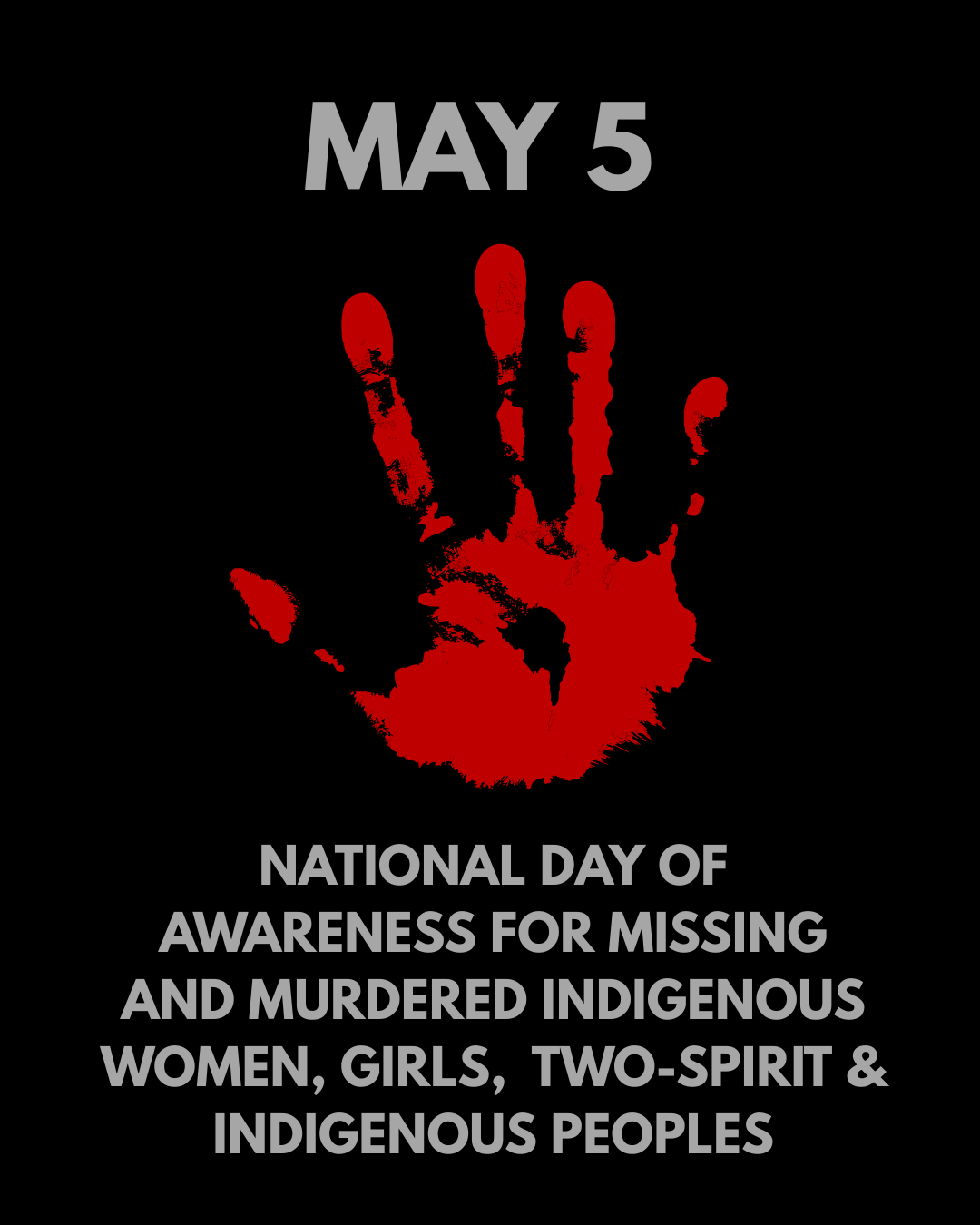May 5 National Day of Awareness Missing and Murdered Indigenous Women, Girls, Two-Spirit, and Indigenous Peoples

May 5th is designated as the National Day of Awareness for Missing and Murdered Indigenous Women and Girls, in honor of Hanna Harris, a 21-year-old woman from the Northern Cheyenne Tribe, who was tragically murdered in 2013. The passage of a Senate resolution in 2017, led by the Montana Congressional Delegation, formally recognized this day of awareness.
Seattle Colleges, in collaboration with the Division of Access, Community, and Opportunity, reaffirms its commitment to advocate for Missing and Murdered Indigenous Women, Girls, Two-Spirit, and Indigenous Peoples (MMIWG2S). As an institution, Seattle Colleges strives to deeply connect with the Coast Salish ancestral lands of the greater Seattle area. The Division of Access, Community and Opportunity acknowledges the shared responsibility in supporting Indigenous leadership and sovereignty to amplify the voices of those impacted by this ongoing crisis.
In historical and recent advocacy efforts, both grassroots and legislative-level actions have driven significant change. In Canada, the annual Memorial Marches in Vancouver and the 2016 launch of the Canadian National Inquiry into Missing and Murdered Indigenous Women and Girls, was in momentum with U.S. legislative action. Key reforms, such as the Tribal Law and Order Act of 2010 and the reauthorization of the Violence Against Women Act (VAWA) in 2013, strengthened tribal criminal jurisdiction and expanded protections for Native peoples. Savanna’s Act, signed into law in October 2020 (Public Law No. 116-165), have geared to further improve Government-to-Goverment relations among Federal, State, Tribal, and local law enforcement agencies in responding to cases of missing or murdered Indigenous persons. The bipartisan law, named after Savanna LaFontaine-Greywind of the Spirit Lake Nation, underscores the urgent need to address the MMIWP2S crisis.
Seattle’s Urban Indigenous communities and Coast Salish nations remain profoundly affected by this crisis. A 2017 report by the Urban Indian Health Institute identified Seattle as having the highest number of reported cases among 71 U.S. cities. Information from The Columbian (2024) indicates that while Indigenous people make up 2% of Washington’s population, they account for 5% of unsolved missing persons cases, with the state ranking second nationally for missing and murdered Indigenous women. The Centers for Disease Control and Prevention (CDC) further reports that in 2020, homicide was among the top ten leading causes of death for both American Indian and Alaska Native females aged 1–45 and for males aged 1–54, highlighting the disproportionate violence faced by Indigenous communities. This crisis affects not only women but also Indigenous men, Two-Spirit individuals, and children, highlighting the disproportionate violence faced by Indigenous communities. Today, over 71% of American Indians and Alaska Natives live in urban areas, making this a crucial issue for our local Seattle communities.
We urge our faculty, staff, students, alumni, and the greater Seattle community to continue to honor Indigenous peoples—especially those leading the fight for justice on the ancestral lands of the Coast Salish nations. Advocacy efforts should not be limited to the week of May 5th but should be sustained year-round.
Seattle Colleges is committed to supporting Indigenous-led solutions, fostering safe spaces on campus, and work toward ending this crisis together.
For more resources, and opportunities to support advocacy, please see the list of resources below.
Several organizations are leading efforts to address this crisis, including:
- Missing & Murdered Indigenous Women, People and Families of Washington
- Missing and Murdered Indigenous Women Washington
- Urban Indian Health Institute
- Washington State Missing and Murdered Indigenous Women and People Task Force
- Cowlitz Indian Tribe’s Pathways to Healing Program
- Washington State Patrol Missing and Unidentified Persons Unit (MUPU) - Missing Indigenous Persons (MIP)
Additional MMIWG2S sources and recommended articles:
- Missing and Murdered Indigenous Women Resources
- UIHI-Missing-and-Murdered-Indigenous-Women-and-Girls-Report
- Washington is 2nd in the U.S. for missing and murdered Indigenous women; have recent efforts made headway?
- Missing and Murdered Indigenous People (MMIP): Overview of Recent Research, Legislation, and Selected Issues for Congress
- Missing and Murdered Indigenous People (MMIP): Overview of Recent Research, Legislation, and Selected Issues for Congress
- Missing and Murdered Indigenous Women (MMIW)
- Missing and Murdered Indigenous People Crisis | Indian Affairs
- Not Invisible: Confronting a crisis of violence against Native women
- The Search: Missing and Murdered Indigenous Women | Fault Lines
- San Carlos Apache Tribe Mourns Loss of MMIW Victim 14-Year-Old Emily Pike | Currents